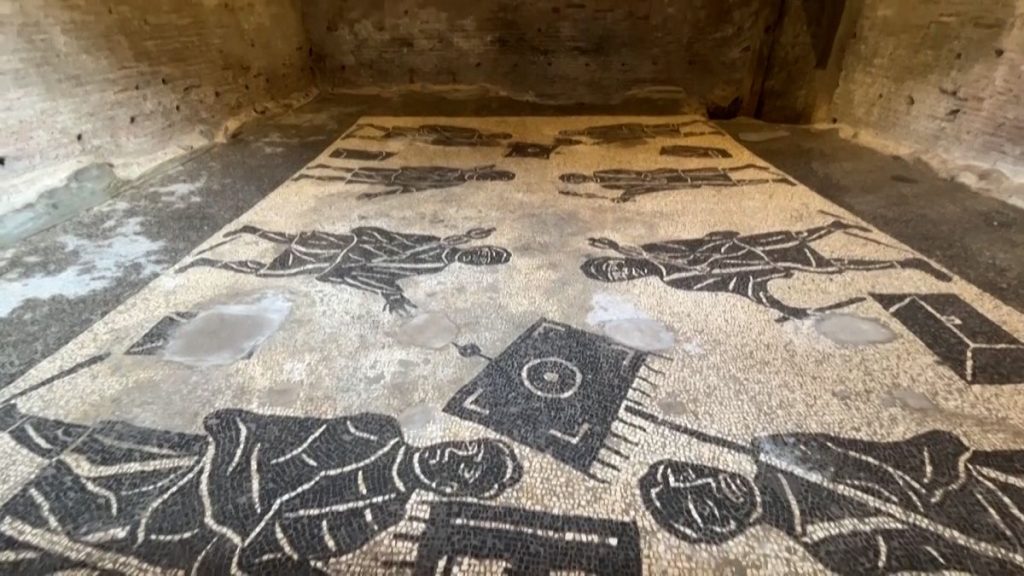The Roman Forum, a sprawling testament to the grandeur of the Roman Empire, has once again unveiled a hidden gem from its illustrious past. Long before the gladiatorial combats and exhilarating chariot races captivated the masses, a vital component of Roman spectacle lay in the voices that resonated throughout the Forum: the imperial heralds. These orators, responsible for stirring public enthusiasm and disseminating official pronouncements, were meticulously trained in the art of rhetoric and vocal projection. After centuries of obscurity, their training ground, a dedicated school within the Forum’s complex, has been meticulously excavated and restored, offering a captivating glimpse into the intricate machinery of Roman public life. This rediscovery illuminates not just the techniques of these ancient announcers, but also the profound importance of public communication in shaping the Roman world.
The resurgence of the heralds’ training school paints a vivid picture of their professional preparation. Imagine young aspirants, carefully selected for their clear voices and commanding presence, undergoing rigorous exercises to perfect their delivery. They honed their pronunciation, practiced modulating their tone and volume to reach vast crowds, and memorized intricate pronouncements, imperial decrees, and announcements of public games. The school’s design likely featured open-air spaces for vocal exercises and enclosed classrooms for instruction in rhetoric and the nuances of official language. The very architecture of the space would have contributed to their development, shaping the acoustics and providing a context for their future performances in the bustling heart of Rome. Their training was not merely about conveying information; it was about captivating the audience, igniting their passions, and reinforcing the authority of the Roman state.
This rediscovered school provides a unique perspective on the sophisticated organization of Roman public life. The heralds were not mere messengers; they were a crucial link between the imperial power and the populace. Their pronouncements carried the weight of authority, disseminating information, shaping public opinion, and contributing to the sense of shared experience that underpinned Roman society. Their voices echoed through the Forum during triumphs, elections, public trials, and announcements of imperial decrees. They were the purveyors of official narratives, playing a significant role in constructing the image of Roman power and stability. Their careful training ensured clarity, consistency, and an aura of authority, highlighting the empire’s commitment to effective communication as a tool of governance.
The reopening of the heralds’ school also offers a fascinating insight into the importance of public speaking in the Roman world. Oratory was a highly valued skill, considered essential for political life, legal proceedings, and even social advancement. The ability to command an audience, to persuade, to inspire, and to inform was a mark of prestige and influence. The heralds, while not necessarily involved in the complex debates of the Senate or the legal arguments of the Forum’s courts, exemplified the Roman emphasis on eloquent and effective communication. Their training reflected the broader cultural value placed on persuasive speech, a tradition that shaped Roman literature, politics, and social interactions.
Furthermore, the school’s rediscovery enhances our understanding of the Roman Forum as more than just a collection of impressive monuments. It was a dynamic, vibrant space where the daily life of the empire unfolded. The Forum was not simply a backdrop for grand events; it was a stage for everyday interactions, public pronouncements, commercial activities, and the constant flow of information. The heralds, with their carefully honed voices, contributed to this bustling atmosphere, ensuring that imperial pronouncements reached the ears of the citizens, reinforcing the connection between the rulers and the ruled. Their presence, and the very existence of their training school, reminds us that the Forum was a living, breathing entity, a crucial hub of communication and interaction.
The reopening of the heralds’ school represents more than just an archaeological discovery; it is a window into the heart of Roman civilization. It allows us to appreciate the intricate mechanisms that underpinned Roman power and the sophisticated methods they employed to maintain social order and disseminate information. It highlights the significance of public communication, a vital tool of governance, and the meticulous training that ensured its effectiveness. This remarkable find serves as a powerful reminder that the echoes of ancient Rome still resonate today, offering invaluable lessons about the power of words, the art of persuasion, and the enduring importance of effective communication in shaping society. The meticulous restoration of this unassuming training ground adds another layer of understanding to the already rich tapestry of Roman history, further enriching our appreciation of this complex and influential civilization.














